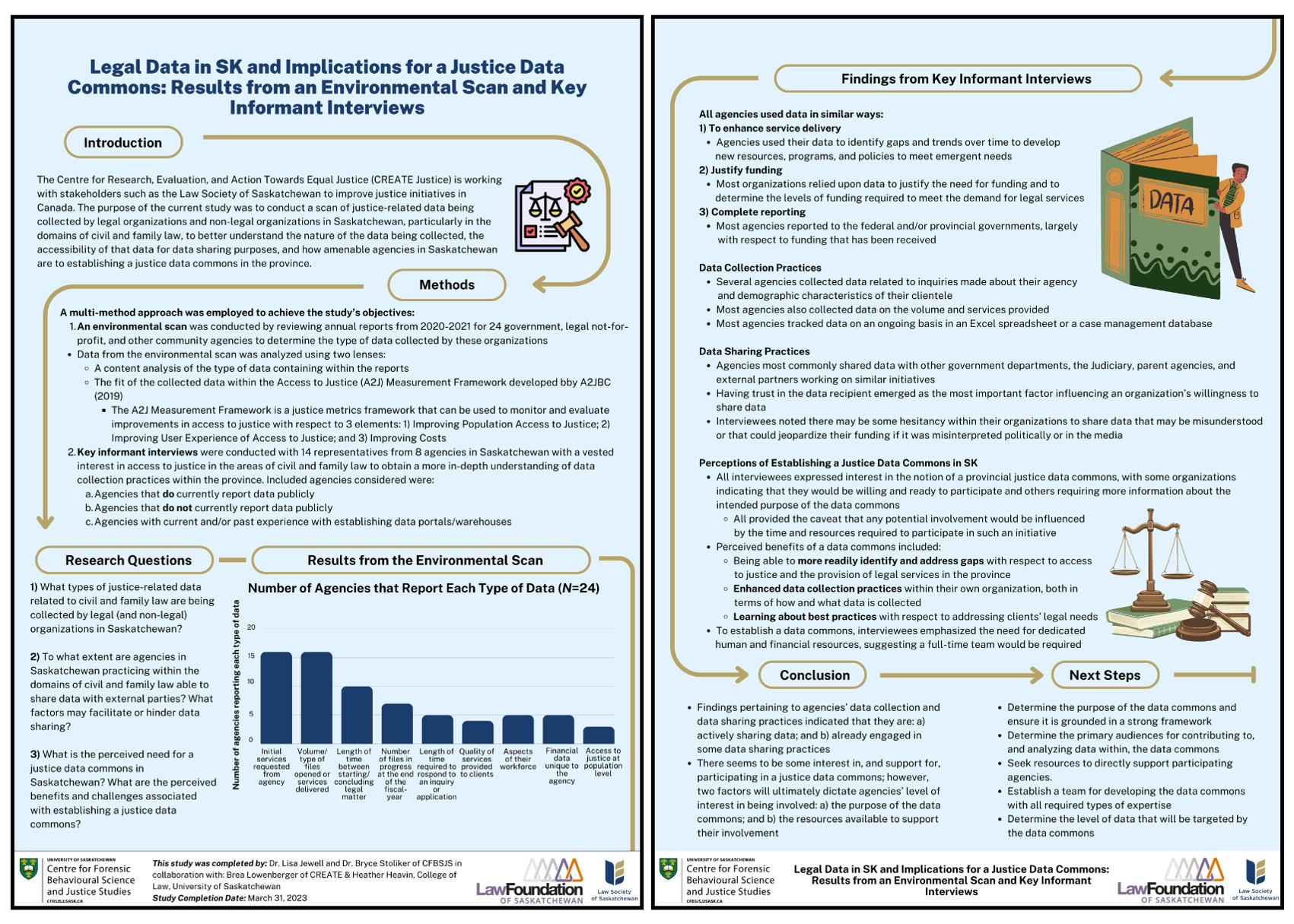
Legal Data in Saskatchewan and Implications for a Justice Data Commons: Results from an Environmental Scan and Key Informant Interviews
The purpose of the current study was to conduct a scan of justice-related data being collected by legal organizations and non-legal organizations in Saskatchewan, particularly in the domains of civil and family law, to better understand the nature of the data being collected, the accessibility of that data for data sharing purposes, and how amenable agencies in Saskatchewan are to establishing a justice data commons in the province.
By Lisa Jewell & Bryce Stoliker In Collaboration with Brea Lowenberger & Heather HeavinThe Centre for Research, Evaluation, and Action Towards Equal Justice (CREATE Justice) is working with stakeholders such as the Law Society of Saskatchewan to improve access to justice initiatives in Canada—particularly, in the province of Saskatchewan. In this effort, it is recognized that there is a need to develop and enhance the evidentiary base for access to justice issues, especially concerning civil and family law (McCashin et al., 2018). It is also recognized that current practices for collecting and analyzing justice data may be insufficient (Canadian Bar Association, 2013; McCashin et al., 2018). To that end, the Centre for Forensic Behavioural Science and Justice Studies (CFBSJS) in collaboration with CREATE Justice is undertaking a research project to develop a more cohesive picture of access to justice issues relating primarily to civil and family law in Saskatchewan.
The main objective of this research project is to compile foundational data concerning the legal needs of Saskatchewan residents. The current report presents the results from the first component of this study: a scan of existing justice data being collected by legal and non-legal organizations in Saskatchewan to determine the usability of that data to identify gaps in the justice system, inform service delivery, improve access to justice, and establish a data commons.
Results from the second component of this study – legal needs surveys of current legal and social service providers, as well as practicing lawyers, to identify legal needs/gaps that exist within Saskatchewan– are available in a separate report (see Stoliker et al., 2023).
Study Purpose and Research Questions
Three overarching research questions guided the study:
- What types of justice-related data related to civil and family law are being collected by
legal (and non-legal) organizations in Saskatchewan? - To what extent are agencies in Saskatchewan practicing within the domains of civil and
family law able to share data with external parties? What factors may facilitate or hinder
data sharing? - What is the perceived need for a justice data commons in Saskatchewan? What are the
perceived benefits and challenges associated with establishing a justice data commons?
Methods
A multi-method approach was employed to achieve the study’s objectives. First, an environmental scan was conducted by reviewing annual reports from 2020-21 for 24 government, legal not-for-profit, and other community agencies to determine the type of data collected by these organizations. Data from the environmental scan was analyzed using two lenses: (1) a content analysis of the type of data contained within the reports; and (2) the fit of the collected data within the Access to Justice (A2J) Measurement Framework developed by A2JBC (2019). The A2J Measurement Framework is a justice metrics framework that can be used to monitor and evaluate improvements in access to justice with respect to three elements: 1) Improving Population Access to Justice; 2) Improving User Experience of Access to Justice; and 3) Improving Costs.
Second, key informant interviews were conducted with 14 representatives from 8 agencies in Saskatchewan with a vested interested in access to justice in the areas of civil and family law to obtain a more in-depth understanding of data collection practices within the province. Three ‘clusters’ of agencies were considered for inclusion in the key informant interviews: 1) agencies that do currently report data publicly; 2) agencies that do not currently report data publicly; and 3) agencies with current and/or past experience with establishing data portals/warehouses. All interview data were analyzed using thematic analysis. Ethical approval for this study was granted by the University of Saskatchewan Behavioural Research Ethics Board
Conclusion
An important contribution of the current study is that it provides baseline information about organizations’ interest and ability to participate in a data commons within the Saskatchewan context. Findings pertaining to agencies’ data collection and data sharing practices indicated that they are: a) actively collecting data; and b) already engaged in some data sharing practices, particularly around the sharing of aggregate data. Further, there seems to be some interest in, and support for, participating in a justice data commons; however, two factors will ultimately dictate agencies’ level of interest in being involved: a) the purpose of the data commons, including the benefit of being involved for the agencies and/or the broader community being served; and b) the resources (time, capacity, expertise) available to support their involvement in the data commons. Trust in the organization spearheading the data commons will also play a significant role in
garnering support for, and involvement in, the initiative.

